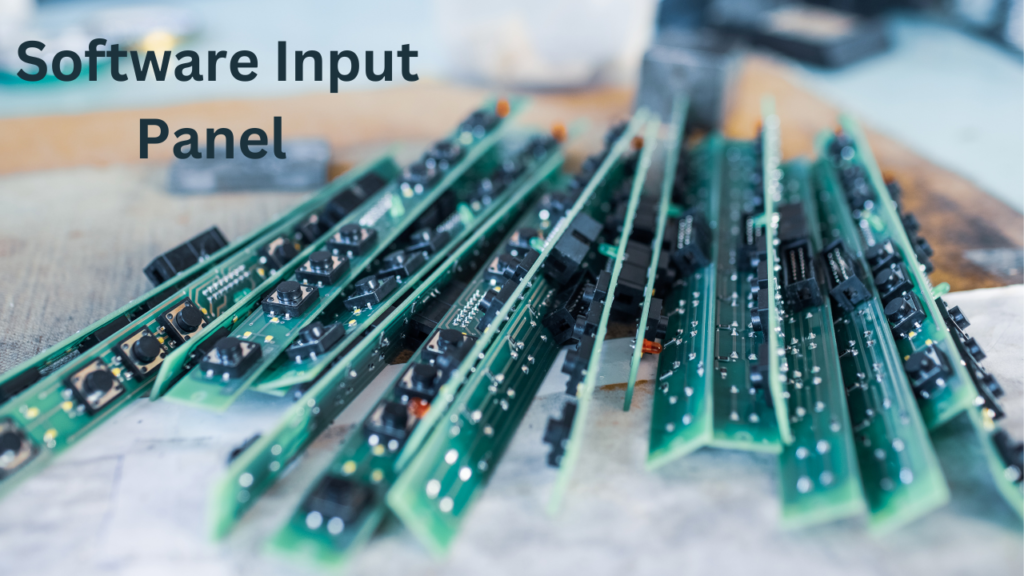In the world of ultramodern computing and mobile bias, how we input information into our systems has evolved significantly. A critical invention in this space is the Software Input Panel( SIP). drafts enable druggies to interact with their bias through touch, stylus input, or indeed voice commands, furnishing a flawless experience for those who do n’t use traditional physical keyboards. This composition explores the significance of Virtual Input Interfaces, their different forms, functionalities, advantages, challenges, and their unborn impact on technology.
What’s a Software Input Panel?
A Software Input Panel is a virtual interface that provides an volition to physical keyboards, primarily for touch- enabled bias. It facilitates stoner commerce by allowing input directly on the screen through touch, handwriting, stylus, or indeed voice input. generally appearing when textbook, figures, or symbols need to be entered, drafts make it possible to class, elect options, and interact with digital content without the need for a physical keyboard.
drafts have come decreasingly popular in smartphones, tablets, alcoves, and indeed laptops, where space constraints make physical keyboards impracticable. In addition to their use in consumer bias, drafts are also vital for creating inclusive systems, furnishing availability options for druggies with disabilities.
Categories of Digital Input Systems
There are colorful types of drafts, each designed for different input styles and bias. Let’s take a near look at the main forms of drafts
1. Virtual Keyboards
A virtual keyboard is maybe the most common form of a Digital Input Panels. It mimics the layout of a physical keyboard, displaying a grid of keys on the touchscreen. These keyboards are generally used for textbook input, enabling druggies to class dispatches, search queries, or enter watchwords. Features like autocorrect, prophetic textbook, and language support enhance the stoner experience, making virtual keyboards a chief on smartphones, tablets, and indeed laptops.
2. Stylus- Grounded Input Panels
Stylus- grounded drafts are designed for bias that support pen input, similar as tablets or graphic tablets. These panels enable druggies to write directly on the screen, with the system feting the input either as handwriting or delineation. Stylus drafts are generally used in creative fields for digital art, note- taking, and indeed hand capturing. They give an intuitive, natural jotting experience, especially when compared to codifying on a small screen.
3. Availability- concentrated Panels
For druggies with physical, visual, or cognitive impairments, availability- concentrated software input panels are a game changer. These drafts are customized to give larger buttons, high- discrepancy displays, and indeed indispensable input styles, similar as voice or switch control. These features insure that all druggies, anyhow of their capacities, can interact with bias seamlessly and efficiently.
How Interactive Input Methods Work
The functioning of drafts is grounded on flawless commerce with the beginning software or operating system. When the stoner interacts with a textbook field or input area, the SIP is touched off to appear on the screen. The design and functionality of the panel depend on the input system needed, be it a keyboard layout, handwriting recognition, or voice command.
The SIP communicates with the operating system via APIs( operation Programming Interfaces), icing that data is captured directly and reused in real time. Advanced SIPs may also incorporate prophetic textbook, allowing the system to suggest words or expressions grounded on the stoner’s input or history.
Benefits of Virtual Input Interfaces
The perpetration of On-Screen Keyboards offers several compelling advantages, which include
- Portability drafts exclude the need for physical keyboards, making bias more compact and movable .
- Customization numerous drafts are adaptable, allowing druggies to change the layout, size, and function grounded on their preferences or conditions.
- Enhanced stoner Experience By simplifying input on touch- grounded bias, drafts ameliorate the ease of navigation and textbook entry, especially on lower defenses.
- Availability Software panels are critical for druggies with disabilities, offering customized options that allow for better commerce with technology.
Challenges and Considerations
While Virtual Input Interfaces give immense value, they aren’t without challenges
- Stoner Experience Variability The effectiveness of an draft is heavily dependent on its design. A inadequately designed input panel can hamper usability, leading to frustration, especially for druggies strange with digital bias.
- Responsiveness and Speed Depending on the device’s performance, drafts may witness pause or detainments, particularly in real- time operations where immediate input is demanded.
- Security As drafts are involved in entering sensitive data( similar as watchwords), security vulnerabilities, similar as keylogging or malware, need to be addressed. Robust security measures must be in place to cover stoner data.
The Process Behind On-Screen Keyboards
Digital User Interfaces are used in a variety of diligence and operations, including
- Smartphones and Tablets drafts are integral to mobile bias, enabling typing, gesture recognition, and voice commands.
- Interactive Alcoves In tone- service alcoves and ATMs, drafts are used for sale inputs, selections, and navigation.
- Assistive Technology drafts acclimatized for availability help individualities with disabilities interact with bias, using voice, touch, or other indispensable input styles.
- Point- of- trade Systems numerous businesses use drafts in their POS systems, allowing cashiers or guests to input information similar as payment details, orders, or product canons.
Main Benefits of Digital Input Systems
Then’s a quick summary of the crucial advantages of drafts
- Space effectiveness drafts save precious physical space on bias, especially mobile bones , by removing the need for a physical keyboard.
- Versatility They can handle a wide variety of input styles, including touch, handwriting, and voice, making them protean for different operations.
- Enhanced stoner Interaction By offering easy- to- use interfaces and customizable features, drafts can streamline stoner commerce with systems and software.
- Advanced Availability Specialized SIPs designed for availability can significantly ameliorate the usability of bias for people with disabilities.
The Future of Interactive Input Methods
The future of Digital Input Panels is looking further promising than ever, with multitudinous advancements on the horizon. crucial areas of enhancement include
- AI Integration As AI and machine literacy continue to evolve, drafts will come more intelligent, prognosticating stoner input with advanced delicacy and speed.
- Gesture and Voice Input With the adding fashionability of stoked reality( AR) and virtual reality( VR), gesture- grounded input and voice recognition will come more current in drafts. These advancements will allow for a further immersive and hands-free stoner experience.
- Customizable and individualized drafts As bias come more stoner- centric, Interactive Input Panels will offer lesser personalization. Anticipate drafts that acclimatize to stoner preferences, codifying habits, and indeed language settings.
Conclusion
Software Input Panels have revolutionized the way we interact with ultramodern digital bias. Their capability to enable easy and effective textbook, number, and command input without the need for a physical keyboard is central to the functionality of mobile bias, availability tools, and tone- service systems. While challenges similar as design complexity and security enterprises remain, the future of SIPs holds great pledge with AI, voice, and gesture- grounded advancements. As technology continues to evolve,Digital Input Panels will play an indeed more significant part in creating intuitive, inclusive, and accessible systems for a wide range of druggies.
crucial Takeaways
- Virtual Input Interfaces give intuitive, touch- grounded druthers to physical keyboards, enhancing stoner commerce across a wide range of bias.
- Different types of drafts include virtual keyboards, stylus- grounded panels, and availability- concentrated panels, feeding to different requirements.
- The benefits of drafts include portability, customization, and enhanced availability, making them essential for ultramodern technology.
- still, challenges like design complexity, responsiveness, and security should be addressed to insure a smooth stoner experience.
- The future of SIPs includes advancements in AI, voice recognition, and gesture- grounded input, making them indeed more stoner-friendly.


